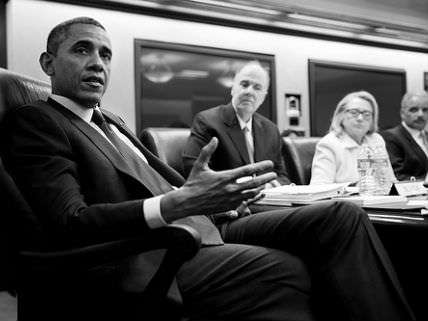Obama's "Fairness" Economy Has Backfired
There are two obvious ways to start fixing income disparity, and neither seems to interest the president.
One of the most seductive parts of President Barack Obama's political message (and the message of progressive Democrats in general) is sympathy for the poor and a willingness to talk about the disparities of capitalism -- about the rich being too rich and the poor being screwed. In some ways, it's the predominant message of the Obama era.

And though it's reasonable to contend that Republicans need to display more compassion -- if for nothing else than their own political survival -- isn't it also reasonable to take stock of how things have gone for the poor under four-plus years of progressive rule?
Now, if you're heavily invested in the market, life is peachy. A confounding fact, no doubt, when one considers that nearly every economic indicator known to mankind has been pretty abysmal of late. We are experiencing high unemployment, a shrinking labor force, stagnant gross domestic product growth and rickety consumer confidence. A disconnected market, though, has been on a historic boom. So if we need any more proof that life really isn't fair, think about this: The rich have the Federal Reserve, and you have Harry Reid.
What does it mean in substance? According to a new Pew Research Center analysis of Census Bureau data, thanks to a robust stock and bond market, coupled with a lousy housing market, the recovery has meant that households with a net worth in the upper 7 percent have seen their net worth rise, on average, by nearly 30 percent in the years after the recession and that everyone else's net worth has dropped by an average of 4 percent.
The economic gap between whites and minorities is even worse. According to the Urban Institute, whites, on average, have two times the income of blacks and Hispanics and six times the wealth, and that gap is accelerating.
This is going on, if you can imagine, even after a tax hike on the wealthy.
The left's answer to this accelerating disparity under Obama will, no doubt, be more regulatory burdens, more tax hikes (the president is still obsessed with closing loopholes on private jets -- a rounding error, in his budget), more deficit spending and more programs that smooth over all the unjust vagaries of life. Most often, these solutions erect barriers to mobility for small businesses and entrepreneurs -- the types of people who help alter the dynamics of mobility. Despite what you may hear, more revenue for government doesn't create wealth. A freer economy and more societal stability do.
If Americans believe that government should promote opportunity and mobility and not equality of outcomes, as this administration claims, allowing more economic freedom would not leave us hapless in the face of unregulated anarchy. It would do the opposite. It would invite more innovation and more opportunity.
Or forget policy. Maybe this is a moral question. Maybe it's a question of leadership. You may believe that government has no business telling us how to lead our lives. I would agree. But if the president were really concerned about inequality, rather than praise abortion mills, he might want to speak out on the importance of families, which, whether we like it or not, are one of the leading indicators of personal prosperity. He might want to speak out about the immorality of a welfare state that helps destroy those families.
Because really, what policy passed or proposed by Democrats over the past four years has started or would start fixing the income disparity in any substantive way? There are two obvious ways to start doing that, and neither seems to interest the president.


Show Comments (99)